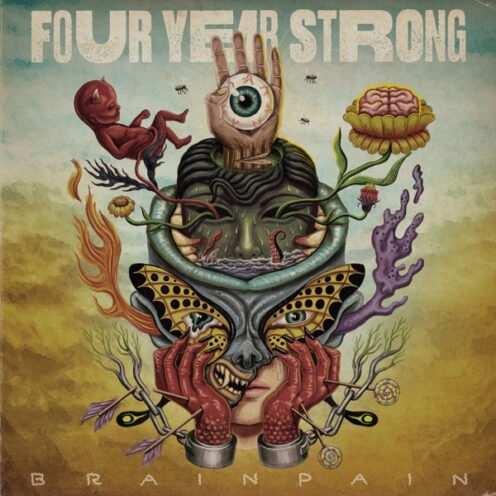
One of the things that gets lost on us as we deal with all of this self-quarantining, self-isolating, and social distancing is how easy it is to forget about taking of ourselves and our mental health. Brain Pain is a catchy, immediate, and socially relevant record as Four Year Strong take a look at what it means to be lost in our thoughts. With song titles ranging from “Crazy Pills” to “Talking Myself in Circles” and “Get Out of My Head,” FYS take it all in stride as they investigate the inner workings of our brains and what makes us all unique and human. On its surface, Brain Pain couldn’t have come at a better time for all of us as we re-learn ways to communicate with each other without that physical connection, and it surely doesn’t hurt that these songs are some of the best work from the band in quite some time.
“It’s Cool” gets things started on the right foot, as Four Year Strong level set with a wide range of emotions. Filled with expansive guitars, solid vocals, and breakneck hooks, it feels like a homecoming of sorts for the band. The collective group of musicians appear to be clicking on all cylinders as they take the listener on a journey through the lens of their headspace, as well as offer potential solutions on we can all cope with the craziness together.
“Get Out of My Head” features some tremendous crunchy guitar riffs that demand to be blasted at the highest levels. Even for the fans who may not connect as much to the lyrical themes present that I outlined in the introduction, there are still plenty of redeeming qualities to be found in these tunes that can turn the sourest of moods into good ones. Other songs such as “Crazy Pills” echo the atmosphere of what it feels like to be teetering on the edge of insanity. Four Year Strong start off the track by singing confidently, “Someone tell me if I’m going crazy / Or if the rattling in my head / Is just another mind game that you’re playing / But I got to know / Am I just another domino / Laying on the ground / That you set up just to knock down.” The lyrics stay consistent with the overarching themes on the record, and the tongue-in-cheek approach of addressing mental health struggles make their message seem less forced.
One of my favorites from the first half of the album is the back-and-forth vocal approach of “Learn to Love the Lie.” The song plays into the strengths of the band: outstanding guitar work, well-timed gang vocals, and underrated harmonies to make the song shine.
The title track turns out to be the most massive song on the record with some down-tuned guitars and circle pit-ready choruses. The song doesn’t take too many melodic turns but serves as a good transition point in the LP. The back half of the album features some other high-energy songs such as “Mouth Full of Dirt,” “Seventeen,” and “The Worst Part About Me.” Sandwiched in between all of these great songs is the underrated ballad, “Be Good When I’m Gone.” It’s a tender moment on the record that comes as an unexpected break in the action, yet never feels out of place in the context of the themes surrounding the rest of the songs. On the second verse, the band let us into their thinking when they sing, “I’m sorry I can’t stop to listen / But I’ve got so much to do, and I’ve got someplace to be / The house looks like the aftermath of a hurricane / I hope it stays that way.” It is an honest moment of self-reflection, and we’ve all likely been in a spot where it feels like we don’t have time to slow things down and connect with the people that mean the most to us in our lives.
The album closer, “Young at Heart,” does an excellent job of summarizing all of the beautiful chaos that came before the track, and rounds out the overall message of self-care that was prevalent throughout the listening experience of Brain Pain. The haunting last lyrics of, “I’m searching for you in the dark / Looking to find the counterpart / That keeps me young at heart / Maybe just turning on the light / Is the perfect place to start,” show a band that gets the essential element of human connection. These lyrics are saying that sometimes taking the simplest of first steps is the hardest part, but everything that follows will make it worthwhile in the end. It’s a great message to leave the listener with and should give plenty of us a mantra of sorts to carry on as we navigate throughout the crisis at our doorsteps.